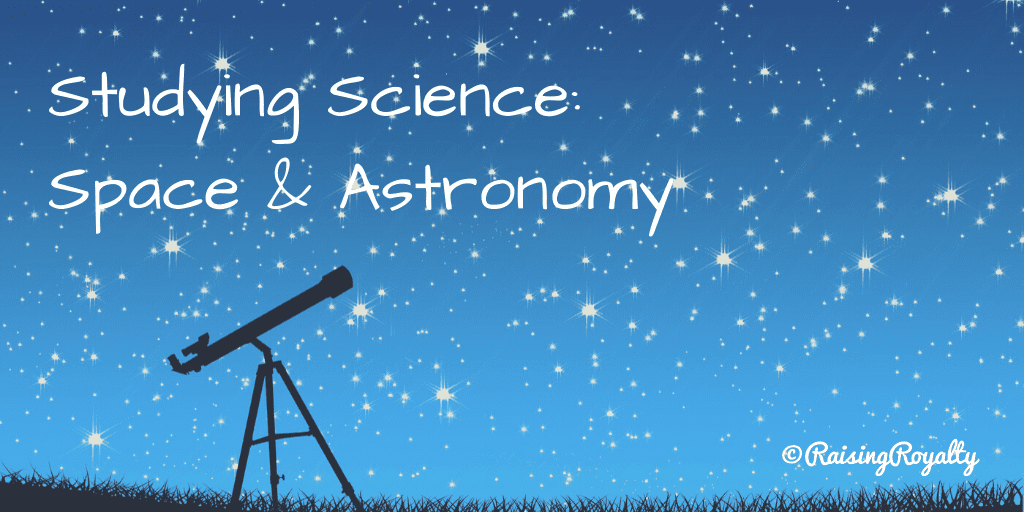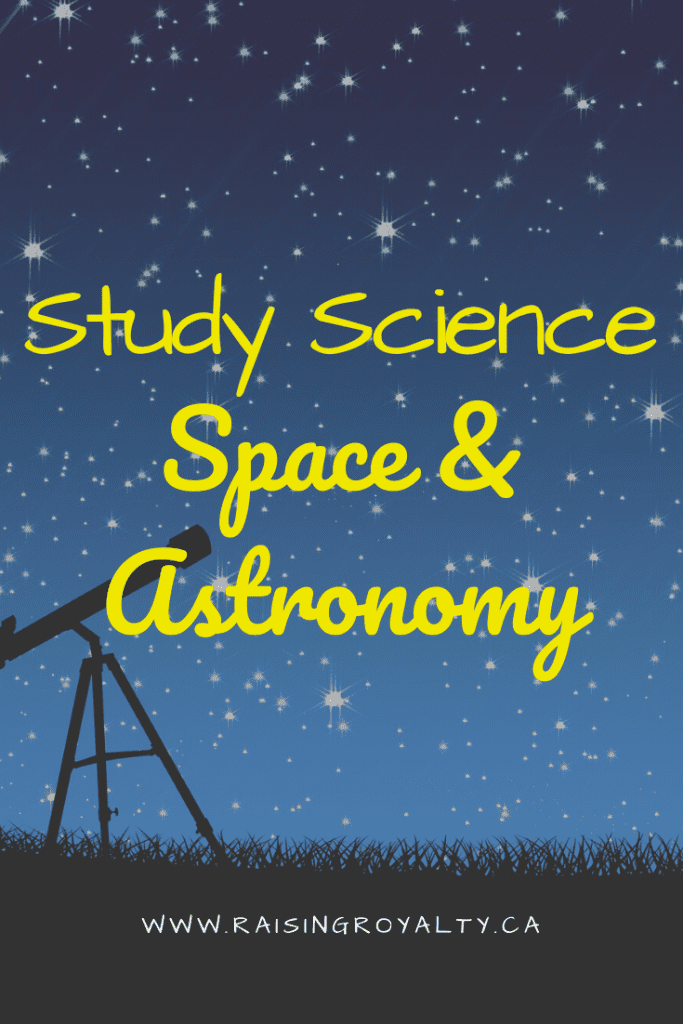
We study space and astronomy in first grade in this homeschool. It’s a fun topic that’s easily accessible for even the non-reader or just beginning reader. And there are tons of picture books, documentaries and even kids’ educational shows that make this topic a lot of fun! So I’ve put together my list of Space and Astronomy science resources that we’ve used.
Humanity has been fascinated with space for as long as we have been around. The ancients built monuments and buildings aligned with celestial events. We’ve used the stars to navigate, mark time, determine festivals and when to plant. Religion, culture and science advancements have all be spawned from studying the stars.
The Space and Astronomy resources:
Fun stories can bring science to life. And we love reading fun stories about topics we’re studying. There are tons of great space-themed stories, from going to the moon to meeting aliens. And you can even enjoy stories taken from real life, like biographies of the astronauts or how some important astronomical discoveries were made.
Picture books:
Space-themed picture books give young children a great visual introduction to the universe. Whether the book uses colorized photos from NASA or cartoon images, your early elementary student will love learning about space with a good picture book.

- Mousetronaut: Based on a (Partially) True Story by Mark Kelly
- National Geographic Little Kids First Big Book of Space by Catherine D Hughes
- A Hundred Billion Trillion Stars by Seth Fishman
- Roaring Rockets by Tony Mitton
- How to Catch a Star by Oliver Jeffers
- There’s No Place Like Space: All About Our Solar System by Tish Rabe
- Curiosity: The Story of a Mars Rover by Markus Motum
- Hidden Figures by Margot Lee Shetterly
- My First Book of Space: Developed in conjunction with NASA by Robert A. Bell
- Toys in Space by Mini Grey
- If You Had Your Birthday Party on the Moon by Joyce Lapin
Read-aloud or Chapter Books:

Space exploration sparked an entire genre of fiction. And many fiction stories have later been the beginning of several modern inventions. Kids who grow up with science fiction stories may end up being the geniuses of tomorrow that shape our modern society. Get them started on their journey of discovery with these read-alouds.
- Space Cat Meets Mars by Ruthven Todd
- Women in Space: 23 Stories of First Flights, Scientific Missions, and Gravity-Breaking Adventures by Karen Bush Gibson
- The Science of Star Wars: The Scientific Facts Behind the Force, Space Travel, and More! by Mark Brake
- A Stainless Steel Trio by Harry Harrison
- The Pioneer by Bridget Tyler
- I was a Teenage Space Reporter: From Apollo 11 to Our Future in Space by David Chudwin
- Astrophysics for Young People in a Hurry by Neil deGrasse Tyson
- Phule’s Company by Robert Asprin
For non-fiction & informative reading:
Some of my favorite non-fiction series for science are the DK Eyewitness, and the “The Magic School Bus” series. Space science is one of the most accessible sciences for kids, so there’s tons of choices, especially for younger children. Invest in books with great pictures, because that’s attention grabbing and will help your kids remember the facts!

- The Magic School Bus Lost In The Solar System by Joanna Cole
- What’s Out There?: A Book about Space by Lynn Wilson
- 50 Things To See With A Telescope – Kids: A Constellation Focused Approach by John A Read
- Your Place in the Universe by Jason Chin
- A Child’s Introduction to the Night Sky (Revised and Updated): The Story of the Stars, Planets, and Constellations–and How You Can Find Them in the Sky by Meredith Hamilton
- You Are the First Kid on Mars by Patrick O’Brien
- The Apollo Missions for Kids: The People and Engineering Behind the Race to the Moon, with 21 Activities by Jerome Pohlen
- DK Eyewitness Books: Universe
- DK Eyewitness Books: Space Exploration by Carole Stott
- Rocket Science: A Beginner’s Guide to the Fundamentals of Spaceflight by Andrew Rader
Multimedia options
Roman archaeology has been ongoing since the days Rome’s existance! The Roman world stretches for a thousand years, so by the end of the empire, the beginnings were already being excavated and studied. Today, we’re still finding ancient Roman villas, mosaics, coins and artifacts throughout Europe, northern Africa, and the Middle East.
Here are a couple of the more interesting documentaries we’ve watched. (Some of them are so cheesy, they’re hilarious and my kids love them!!)
Also, I highly recommend the YouTube channel “SciShow Space“, filled with easy-to-understand short videos on some of the more interesting parts of space and astronomy.
Activities you can do:
These lapbooks and unit studies make fantastic activities to help guide your learning:
- What is the History of Space Exploration? Lapbook
- What is the Solar System? Lapbook
- What is a Star? Lapbook
- What is the Moon? Lapbook
- What is the Universe? Lapbook
- Stars and Constellations Express Lapbook
- Sun Express Lapbook
- Astronomy Express Lapbook
- Planets Express Lapbook
- Exploring Astronomy Lapbook with Study Guide
You can get hands-on with these space-themed kits too!

- Space Racers: Make Your Own Paper Rockets
- Cut and Make Space Shuttles: 8 Full-Color Models that Fly
- Make: Rockets: Down-to-Earth Rocket Science
Other Astronomy Resources:
Here are some interactive websites that will help you and your kids learn more about space and astronomy:
- NASA for Kids
- Windows to the Universe
- Science for Kids: Space
- ESA Sky
- Giant Worlds
- Online Solar System Model
- Stellarium
Plus don’t forget to go to a planetarium or observatory and see the stars for yourselves! And if an astronaut visits near you, be sure to attend. These amazing people love to talk to curious kids!
You may also like:
Egyptian History
Mesopotamian History
Chinese History
Aztec, Mayan & Incan History
Ancient Roman History
Ancient Greek History
Weather & Air Science
Earth Science
What’s your favorite way to study science? Do you prefer to watch it, read about it, or get hands-on?

